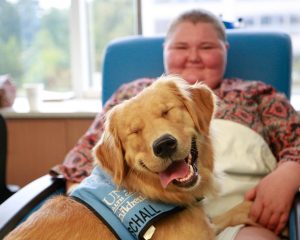
A weary look crosses the face of a teenage girl; her jaw tightens, and her body tenses. Another day, another needle stick — a typical appointment for a pediatric cancer patient. But then, the tapping of nails on a shiny floor brings a different expression — a smile — for SCHALL, the rehabilitative facility dog at the N.C. Cancer Hospital’s pediatric hematology oncology clinic.
Lifting spirits and helping ease tension are SCHALL’s calling cards, as she strolls through the unit with primary handler “MT” Fore, MSW, LCSW, and checks in on patients with UNC Lineberger’s Stuart Gold, MD, chief of pediatric hematology-oncology. SCHALL spends her days performing interventions that help reduce patient anxiety, depression and stress.
“Her role is also to normalize the clinic for kiddos so that it does not seem so foreign or scary,” Fore said.
Named in honor of the late James E. Schall Jr., U.S. Army, who served in Vietnam and Korea and had a decorated military career, SCHALL was trained by paws4people, a Wilmington, North Carolina-based nonprofit that raises, trains and places assistance dogs. According to Kyria Henry, executive director of paws4people, SCHALL began training at three days old and received more than 300 hours of training over two years in both Wilmington and West Virginia before her placement with the N.C. Cancer Hospital.
“SCHALL worked with student trainers from the paws4people UNCW Service Dog Training Program and paws4people staff to refine her skill set for her job in the pediatric oncology clinic,” Henry said.
SCHALL is tasked with providing therapeutic assistance to any patient, family member or care team member in need, but she has a team of people who support her work with pediatric patients.
Gold said the goal of the pediatric hematology oncology clinic is to treat the whole patient. In addition to medical treatment, that can include talks with social workers, music therapy, art therapy and now, pet therapy. “We try hard in our clinic to provide care for every part of the being, and having a pup adds to that,” Gold said. “She helps provide total care for the family.”
“Adding SCHALL to our clinic family was somewhat of an experiment that Dr. Gold and I took on. It all started with an idea … ,” Fore said. “We felt she would be fabulous addition to clinic but were not sure exactly how it was all going to work on a daily basis. We still are learning and growing and adjusting and adding in terms of how we use SCHALL’s abilities to enhance patient and staff experience.”
SCHALL’s duties take her all over, and she’s likely to be hanging out in patient rooms, snuggling in a bed or begging for a paw rub — her favorite — from patients and families in the clinic lobby.
“Patients want to see SCHALL more than me,” Gold said. “They ask for SCHALL on repeat visits. It’s common for the first words to come out of their mouths to be, ‘where’s SCHALL?’ ”
The idea of having a facility dog in the clinic also gained support outside the hospital. Several campaigns were launched to raise funds to make SCHALL a member of the pediatric oncology team, and donors responded positively to the idea.
“So glad I was able to help. Being a cancer survivor myself, I know how much this precious dog will be able to help the children,” said Denise Herndon, who donated to one of the campaigns.
And help SCHALL does, but often in costume with plenty of her signature doggie charm.
“She has a big job, but you would never know, as she remains relaxed, is not afraid to show her silly side and is just as sweet as she can be,” Fore said.
And while the smiles on patient and family faces show the impact she can have, SCHALL has also managed to charm the seasoned staff in the pediatric clinic.
“Staff appreciate SCHALL as a beloved member of the team,” Fore said. “For them she is comic relief, stress relief and a sweet co-worker to comfort them when needed.”
“We’re in a high-stress field with a high burnout rate, and she helps everyone relax,” Gold said.
Seeing the impression SCHALL has on staff members and parents has been eye-opening, and Gold said he is hoping to do research on how a facility dog can impact kids and families. He hopes to see facility dogs used more on in-patient units and in hospital-based support groups, like the Adolescent and Young Adult Cancer Support Program.
“It’s one of those programs that the impact is subtle and intangible, but I hope that this will be a startup program,” Gold said. “I hope we’re an example for other programs, and it will keep evolving.”
SCHALL has quickly become an important member of the clinic’s team. And just like her human colleagues, she wants to unwind at the end of the day.
“She’s a dog, so when you take off her vest, she plays,” Gold said. “She has a PhD in being a dog.”
